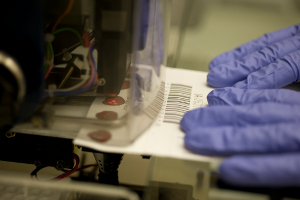Families tell their stories
In celebration of the many successes of the Iowa Newborn Screening Program, Lab Link asked families for updates on some of these outstanding children. We asked, “Where are they now?” and moms and dads answered.Newborn Screening is a process in which infants are screened for inherited diseases. Most infants with an inherited condition show no obvious signs of disease immediately after birth. However, with special tests, the newborn screening program can identify an infant who may have one of 50 disorders and alert the doctor and caregivers of the need for special care of the infant.
Since 1966, thousands of Iowa babies have been helped through early detection of inherited conditions that, if left undetected and untreated, can have devastating health effects. The Iowa Newborn Screening Program works around the clock, 365 days a year, to ensure that these conditions are identified so lifesaving treatments can be provided and babies can thrive.
With early diagnosis and medical treatment, complications from these serious, but uncommon, conditions can usually be prevented. The goal is to identify the disorder before the problem has time to cause damaging health effects.
In Iowa the law requires all babies have the newborn screen panel so a few drops of blood are obtained from a newborn baby's heel before being discharged from the hospital. The blood is then sent to the State Hygienic Laboratory for testing.
Parents are usually not notified when the screening results are within the normal range. Generally, parents are notified only if retesting or further testing is needed. If your baby's health care provider asks you to bring your baby in for testing, do so as soon as possible.
You may refuse testing. If you refuse, you must sign an Iowa Neonatal Metabolic Screening Waiver for Newborn Screening Refusal form and accept the legal responsibility for the consequences of this decision.



